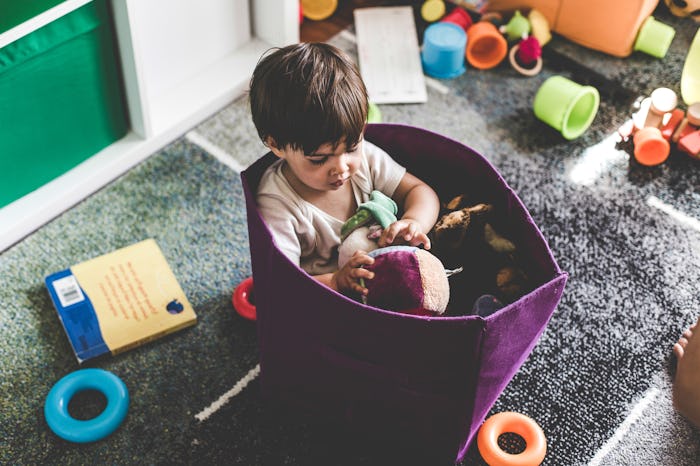Life

If You Skip Preschool, Here's How Science Says It Could Impact You Later In Life
I'll admit, I had a hard time signing my son up for preschool. My husband and I were in the process of determining what was at the root of his social issues, and he really struggled. We also debated whether we'd send him to private school or public; it was a lot. In the end, we thought that the benefits of pre-K outweighed our reservations, and at age 4, he made his way into the classroom. I'm glad we made the choice. It turns out there are some ways not going to preschool affects you later in life.
In 2011, New York City became of the the first cities in the country to offer free, full-day pre-K for all 4-year-olds living in the five boroughs. It was the cornerstone of Mayor Bill de Blasio's mayoral campaign, and he made it happen quickly. In 2017, the mayor proposed to expand the program to the city's 3-year-olds as well, in a modified format. When he did this, he cited the growing research literature that's shown that there is a real difference in educational outcome for kids in the United States who are afforded the ability to attend preschool and pre-kindergarten, reported The New York Times. The research shows that, simply put, children who go to preschool perform better in elementary school, and it's predictive of a better future.
Not going to preschool, which is still not a mandatory program federally, can be associated with negative outcomes, and here are just a few of them.
1Without Preschool, Peer Relations Can Be Stunted
Often, when you read about the benefits of preschool later on in life, you hear a lot about test scores and aptitude. There's discussion about reading ability and all sorts of stuff about maths, but research published by The Journal of Child Psychology and Psychiatry has noted that you can't overlook the communication and socialization component. Researchers wrote that preschool, specifically preschool with highly attentive learning environments enriched with early childhood intervention for children who require it, "led to sustained benefits in social‐emotional skills, improving second grade classroom participation, student–teacher relationships, social competence, and peer relations." They found that preschool and the interventions that occur in that environment are incredibly helpful when students are learning to interact with educators and each other.
2Students Are More Likely To Drop Out Without It
As per research recently published in the Economics and Education Review, children who receive early childhood education, meaning either one or two years of quality preschooling, are more likely to succeed in elementary school, and less likely to drop out of school when they get into intermediate, secondary, and beyond.
Their research found that attending two years of preschool is an even greater predictor of long-term outcome and school retention than attending a single year, but that even only attending pre-kindergarten has a positive benefit on school completion.
3Students May Lag Behind In Maths.
According to Early Childhood Research Quarterly, students who receive high-quality early education perform far better in elementary maths than students who have received no preschool. Researchers wrote that they found there are "longer-term associations of preschool quality with mathematical skills in adding and subtracting through grade 3 (age 9). A highly stimulating environment at preschool, which introduces children to mathematical content by playing number games, reading books with mathematical content, and by providing children with materials containing mathematical content..." They go on to note that they're not advocating military school for these children, more that they're advocating interaction, exposure, and the guided play that works best for the kids.
4Studies Have Shown People Who Attend Preschool Are Less Likely To Abuse Drugs & Alcohol
This one seems like a stretch, and it might be. The research, though heavy and longitudinal, was flawed in that it only looked at one population in one area. However, it was important enough for Hirokazu Yoshikawa, Christina Weiland, and Jeanne Brooks-Gunn to include it in their work "Why Does Preschool Matter." They wrote that models have shown that children who go to preschool become adults who are less likely to abuse drugs and alcohol, and also less likely to experience depressive symptoms as an adult.
5They May Struggle In Middle School
If you start out behind, you might stay there. A study conducted that looked at the Tulsa, Oklahoma Head Start program found that the added benefits of preschool last far longer than they originally anticipated. They learned that those students who start elementary with a working knowledge of math, reading, and social interaction end up carrying that all the way through until at least middle school.
Middle school is often where education begins to hit the skids. The transition between elementary and intermediate school is made easier if the foundation is solid, which preschool helps achieve.